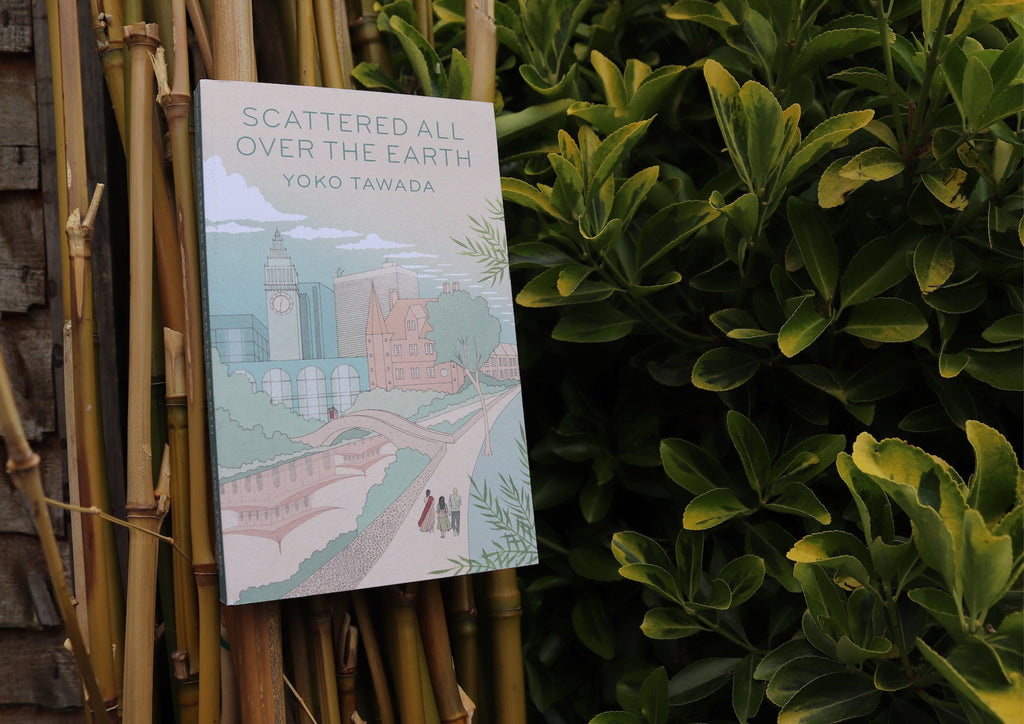
I love that reading one book can sometimes point us in the direction of another. This week I read Scattered All Over the Earth, the new novel by Yoko Tawada, translated from the Japanese by Margaret Mitsutani, and, as a result, I ended up gravitating back to an old book, and reading one of my favourite novels of the year, too.
Scattered All Over the Earth has an attention-grabbing premise: Japan no longer exists. It’s not clear whether the story is set in a future reality or a parallel world but, in any case, climate crisis has meant the sea has swallowed Japan and its inhabitants are now, as the title would suggest, scattered all over the earth.
The beginning of the novel is strong. We follow Knut who has become interested in Hiruko, a woman he first saw on a documentary talking about the disappearance of her country. Japan is named only once in the novel, and is more commonly referred to as “Land of Sushi”, although Knut and many other people are adamant that sushi is actually from Finland. Folktales and origin stories seem to have become entangled, and as many lost characters search for things that remind them of their homes, they discover that their memories, much like the fusion food they are eating, have morphed and melded with other people’s nostalgia, creating something malleable.

There are pros and cons to this, and much of the novel is about whether it’s important to set yourself apart from other people, if it’s necessary to know where you come from, and how much weight should be given to tradition. If a country is a parent, and a language a mother tongue, should we fly the nest, and when? How can we use technology to communicate without losing something of ourselves? How can we celebrate our roots without creating division? Unfortunately I found a lot of the novel’s philosophical discussions to be surface level and lacking in nuance, including a clumsy discussion on gender and queerness. I did enjoy how the book used intertextuality, with folklore and the opera of Carmen, to show how every tale is connected, but it lacked direction and fizzled out towards the end. I’d still recommend it for fans of Klara and the Sun by Kazuo Ishiguro and The Memory Police by Yoko Ogawa if the premise takes your fancy.
However, I did enjoy Scattered All Over the Earth for the paths it led me down, and it encouraged me to go back to one of my favourite poetry anthologies: Poems on the Edge of Extinction, edited by Chris McCabe. This book is a celebration of linguistic diversity and a reminder of our commonalities and the role that verbal storytelling plays in human life all around the world. Half of the 7000 languages spoken in the world will be lost by the end of the 21st century; indeed, one language is disappearing every two weeks. This book aims to preserve and hopefully reignite 50 endangered languages, celebrating the work of poets and translators. One of my favourite poems in the book is translated from Manx by the writer of the original poem, Robert Corteen Carswell. His piece “The Leaves of Autumn” ends: “I am bending down to put my head / against this ground, that attracts heads / and bodies enough, in the hope / that it feeds my very soul.” Every poem is followed by information on the language, the author, and the translation process, and it’s an absolute gem of a book.

After revisiting that, and still rather unsettled by the idea of Japan disappearing from the earth, I decided to read the novel Cold Enough for Snow by Jessica Au, and I absolutely fell in love with it. It’s a short book at just under 100 pages, but it’s perfectly formed, following a daughter and a mother who meet in Tokyo for a holiday. They’re awkward around each other, the daughter assuming a parental role which she hopes her mother will appreciate, but which actually makes her mother fatigued. They’re enjoying each other’s company, whilst simultaneously wishing the other person was different – longing for an idealised version of their mother/daughter, one they’d conjured in their absence. It’s a novel all about gaps in understanding, the things characters can’t say to each other, and the small, wonderful moments they can share because deep down there’s a connection they can’t really articulate. Read Cold Enough for Snow for its descriptions of delicious food, Japanese gardens in the autumn, and perfectly depicted family tension.
Jen Campbell is a bestselling author and disability advocate. She has written ten books for children and adults, the latest of which is The Sister Who Ate Her Brothers. She also writes for TOAST Book Club.
Images courtesy of Jen Campbell.
Add a comment